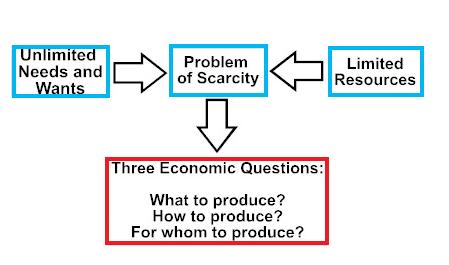Economic system refers to the organizations and institutions created for the purpose of satisfying the wants of human beings. In a country, available resources have to be utilized to manufacture and distribute goods and services, which would meet the needs of the people so that they are satisfied. These institutions and organizations function with their own rules and regulations.
The economic system has certain broad characteristics.
- The economic system always functions with scarcity of resources. How the system effectively and efficiently uses the resources will determine the extent to which the needs of the people are met.
- An economic system comprises people. That is, a society of human beings alone can constitute economic system.
- A set of institutions are created and used for the purpose of smooth functioning of an economic system. For example, banks, money, technology, government, price mechanism, planning etc., are all institutions through which the systems operate.
- The basic objective with which an economic system functions is to satisfy the wants of the people. Unless there is want for a commodity or service, nothing can be produced. Hence, the economic system allocates the resources in such a way that the wants of the people are satisfied.
On the basis of the above characteristics of an economic system, it should be clear that the economic system is very dynamic in nature. That is, the economic system undergoes changes with every change in the institutions, though the rate of change would differ from institution to institution.
The economic system functions to answer three vital questions:
-
What to produce ?
-
How to produce ?
-
For whom to produce ?
Answering these questions assumes enormous significance as that would determine every activity within a country.
The first question ‘What to produce’ depends on what is wanted. The economic system would throw signals through which the requirements of the people could be understood. But not all wants could be satisfied. This is because; a country may not be gifted with all the necessary resources to produce all the goods. Hence, depending upon the resource endowment a country would decide what it could produce. Then there is a problem of prioritizing the available resources among the goods to be produced. Resources should not be used for the production of unwarranted goods. The production of goods, which are harmful to human beings, like narcotic drugs, should be prevented. Hence, considering the availability of resources, the economic system should opt to produce only goods that would satisfy the wants of human beings. In this context it is also necessary to weigh the individual requirements and the national requirements for goods. The latter should be given preference over the former.
The second question ‘How to produce’ addresses basically, issues relating to selection of right strategy, technology and investment. For example, a country like India, with very huge population should not prefer capital-intensive technology, as that would lead to more unemployment of human resources. Similarly, while selecting the technology, a country should weigh a number of considerations like relevance of technology, cost of technology, support in case of failures, consequences of the technology used, etc. Another vital aspect is the investment that a country has to make while selecting the strategy and the technology. A very important question is whether the available funds should be invested in sophisticated research and development or meeting the basic needs of the people. Hence, the second question would ultimately determine the efficiency with the available resources are utilized.
The third question ‘For whom to produce’ implies that based on the resource utilization, the country as a whole should benefit and not a few segments. Hence, having produced the goods and services, how they could be equitably distributed is an important aspect. The distribution of national product would differ from country to country depending upon the economic system in vogue.
It has been already pointed out that the way in which the above three questions are answered depends on the economic system which functions in a country.
Different Types of Economic System
Four imprtant types of economic system are;
- Markets Economy System– is the process how is country produce their products and how they distribute into market and control by people of the country. The three questions ask in marketing is what to produce? To whom producing? How to produce?.
- Mixed Economy System- is the economies where most of decisions are made by individuals but governments also play some roles.
- Traditional Economy System– is the economy based on how community or people use to trade within their local communities, by direct trade and exchanging one good to each other. In mixed economy most of the resources are inherited.
- Command Economic System– the government control the economy and they make decisions and influence the firm or organization. In the command economic system government regulate the prices and other things which are in firms.
